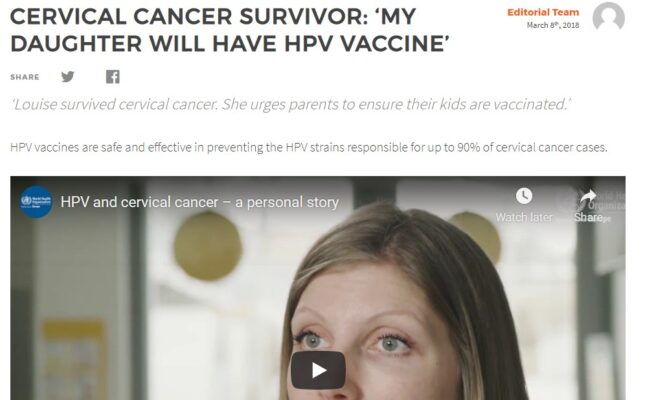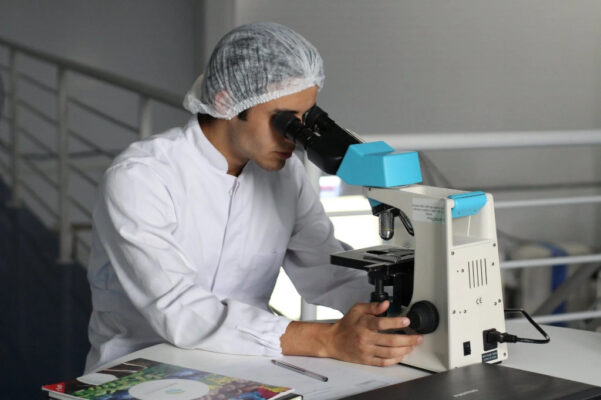Cancer. The Big C.
It’s a word that fills us with dread and reminds us of those who have been lost to the disease.
Few families are untouched by cancer. In fact, 2.6 million people are diagnosed with cancer in Europe every year. 1.2 million die annually.

Several vaccines can prevent cancer and researchers are working on a new generation of ‘therapeutic vaccines’ which could change how we think about vaccination.
So, what vaccines are available to prevent cancer-causing infections?
There are currently two: the Hepatitis B vaccine reduces the risk of developing liver cancer and the HPV vaccine which prevents cervical cancers in women, as well as genital warts, anal cancer and some head and neck cancers in people of any gender.

Professor Paolo Bonanni, University of Florence, Italy, and a member of the Vaccines Today Editorial Board, says the impact of vaccines on global cancer incidence over the past decade has been unprecedented.
‘The implementation of hepatitis B vaccines within the Nation Immunisation Programmes in almost all the countries of the world has begun to impact not only cirrhosis [a liver disease], but also on primary liver cancer,’ he says.
‘In China, the proportion of people infected with hepatitis B has fallen from 10% before universal vaccination to around 1% in younger generations. In the coming decades we will prevent tens of thousands of hepatocellular [liver] cancers and save an incredible number of lives.’
Over the past decade the HPV vaccine has been rolled out across Europe, first in adolescent girls and more recently (in many countries) in adolescent boys. It offers hope of preventing cervical cancer, a disease which takes the lives of women in their prime years and can have a profound impact on fertility.

HPV infection causes changes in cells which can later become cancerous. As this process takes time, it will be some years before a definitive decline in cervical cancer rates comes into view.
However, the vaccines are already showing steep falls in the number of people with cancer-causing infections. Researchers are confident that this will translate into much lower death rates around the world in the years ahead.
Prof Bonanni says HPV is the second most important carcinogenic factor after cigarette smoke. Real-world evidence from Finland, Sweden and the US are already showing a real-world reduction in cervical cancer among women who were vaccinated as adolescents.

Countries with low HPV vaccine uptake (such as Japan) will not reap the same rewards. Early adopters (like Australia) are hoping the disease could effectively be eliminated as a public health concern in a generation.
Europe as a whole is still behind Australia. Some countries were slower than others to introduce the vaccine and achieve high uptake rates in girls and boys. Widespread availability of HPV vaccines, better screening and improved treatments have put Europe on a path to elimination – in line with the WHO plan to suppress the disease.
‘Europe has an unprecedented opportunity to aim for the elimination of HPV-related disease and end the death it causes,’ says Antonella Cardone, Director of the European Cancer Patient Coalition.
‘Despite the availability of a vaccine proven to be an effective primary prevention measure to reduce the burden of HPV-related cancer, many challenges remain in achieving universal, gender-neutral HPV vaccination in the EU. We need to raise awareness among the population so that citizens understand the importance of vaccination.’

What’s a vaccine anyway?
Vaccines are generally associated with disease prevention. But most cancers are not caused by infection. So why is there so much buzz about cancer vaccines?
The answer requires us to fundamentally rethink how we view vaccines. Rather than considering prevention alone, we can think of vaccines as a way to prompt the body’s own immune system into action: vaccines can be viewed as a therapy.
Disease prevention classically means introducing a killed virus (or part of a virus, such as the SARS-CoV-2 spike protein) to the body, triggering an immune response. The next time the body encounters the virus or ‘foreign’ protein, it remembers and reacts by destroying it.
However, researchers have been looking at other ways to harness the power of our immune systems to treat illness. These therapeutic vaccines could turn the immune system on cancerous cells.

The concept is not new. The BCG vaccine, developed to fight TB, has been used as a kind of immunotherapy against bladder cancer. However, advances in molecular biology – and the arrival of effective mRNA vaccine technology – promise to accelerate the development of therapeutic vaccines.
For example, researchers in the Netherlands aim to make tumour cells more visible to the immune system. By flagging tumours for destruction, cancer vaccines aim to encourage the body to target cancer cells.
The development of mRNA vaccines, currently being used against COVID-19, also holds promise in the search for cancer vaccines. They may even become a new weapon in the arsenal targeting HPV-related cancers.
Researchers working on an EU-funded project (TIGER) say the success of mRNA technologies, faster and cheaper ways to test the genes of tumours, and advances in cell therapies are accelerating scientific progress.
Dr Marina Cools of eTheRNA, a spin-off company from the Vrije Universiteit Brussel (VUB) which is testing a therapeutic vaccine against cancers caused by the HPV16 virus, says existing HPV preventative vaccines will reduce the impact of cervical cancer in Europe and the US in the coming decades. However, middle-aged people in the developed world for whom it is too late to have the preventative vaccine, and people in low-income countries, remain vulnerable. Those who develop cervical cancer could receive a therapeutic vaccine which is now in early-stage clinical trials.

Her colleague, Dr Volker Germaschewski, told Vaccines Today these therapeutic vaccines work by stimulating the body’s existing immune response. ‘In effect, you are boosting something that is already there,’ he said. While this approach is still being tested in trials that will take several years, scientists are confident that therapeutic cancer vaccines will be a reality within a decade.
‘It is now possible to identify specific mutations in tumour genes and develop patient-specific immunotherapies,’ said Dr Cools. ‘In future, rather than having a therapeutic vaccine for cancer in a certain part of the body, it will be possible to create different vaccines depending on the composition of your own tumour.’
Prof Bonanni says these and other new approaches can be complex but have real potential. ‘Therapeutic vaccines are challenging and difficult to develop and test, but I am confident that exceptional progress in basic science will deliver concrete results,’ he says. ‘This will complement the excellent preventive vaccines we have today with products that avoid the progression of cancer. It may also be possible to heal those who have the disease but are not yet in the final stages of damage and extension.’
It’s still early days for therapeutic vaccines and, as the success of clinical trials is never guaranteed, it could be some time before they are the norm. However, the COVID-19 pandemic may have indirectly put science on a fast-track to a whole new era in vaccination.




